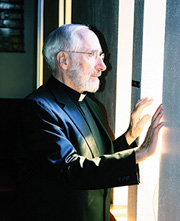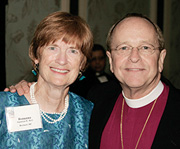Debating the Mind of God
One of the senior clergy in the community provides a unique pastoral perspective on the ongoing turmoil in the Episcopal Church, one that resonates in churches, synagogues, mosques, and other houses of faith across the country.
SEE ALSO
Resources for finding faith traditions that aren’t exclusionary towards GLBT clergy.

Many churches today are suffering fractures and threatened schisms be cause some among their numbers believe that homosexuality is a sin, and others believe that homosexuality is a normal variant in human sexuality. No doubt with an eye to the 2008 Lambeth Conference, a meeting of the world’s Anglican bishops, a volume of essays by nine Cambridge theologians has been published in the UK.
An Acceptable Sacrifice? Homosexuality and the Church (SPCK Publishing, 2007) has generally been greeted with kudos. John Habgood, former Archbishop of York, writes in his review for the Times Literary Supplement, “While there are texts which might at first sight give the claim [of homosexuality as a sin] some credibility, it is clear from reading them in context that they are not actually answering the kind of questions which today’s protagonists on both sides want to ask. … To extract a number of texts purporting to be about homosexuality, and to condemn a whole group of people for a personality trait which is not of their making, may look at first sight like faithfulness to the biblical text. In reality it is not to treat the Bible seriously, through failing to take account of its ultimate message about the sovereignty of love and the process by which this came to be.”
Judging from the reviews, these Cambridge theologians reasonably and successfully present a case that requires a thinking person to conclude that homosexuality is not incompatible with Christian teachings. Nonetheless they are being criticized in some quarters for not stating this unequivocally, but rather allowing readers to draw their own conclusions. Perhaps the contributors, in their presentations of fact and logic, failed to take a hard stance, but Archbishop Emeritus Desmond Tutu, writing in the Foreword, has no such reserve:

“No. It is not acceptable for us to discriminate against our brothers and sisters on the basis of sexual orientation, just as it was not acceptable for discrimination to exist on the basis of skin colour under Apartheid.”
At the crux of this struggle of dual sexuality versus a continuum of sexuality lies hermeneutics, the study and application of theories of literary interpretation (most frequently the Bible). The Bible, it seems, like statistics, can be made to say anything. Both right thinkers and wrong thinkers struggle with various translations of contemporary and archaic words, tossing out a phrase here and a phrase there, forcing the text to say whatever will support their positions.
Most scholars and theologians, both past and present, would likely find this exercise quite beside the point. It has been their contention that the Bible was never intended to be literally accepted, but rather is an engaging blend of literature and history—wisdom stories for teaching values and the inspirational story of a people’s developing sense of God. In a 1993 interview with the Arizona Daily Star , Reform Rabbi Joseph Weizenbaum of Tucson’s Temple Emanu-El stated, “All books, including the Bible, are written in a time-place situation. If we took the Bible literally, we would be dropping stones on bad kids and chopping off arms and legs. Imagine cooking an animal in your back yard to please God!”
Setting aside the biblical argument altogether, Rev. Ralph Lasher of Houston’s Bethel Evangelical Lutheran Church turns to Episcopal Church doctrine and practice to provide a unique perspective on the attempts of some within the Episcopal Church who seek to outlaw homosexual clergy.
I was baptized, confirmed, and ordained first as a deacon and later as a priest in the Episcopal Church. I have many fond memories of the Episcopal Church, but sometimes wonder about what appears to be happening in both the Episcopal Church and in its spiritual parent, the Anglican Communion. Large numbers of clergy and laity in both are seriously pondering legislation, which in effect would prohibit God from taking certain specific actions. To those of us who have been accustomed to thinking of God as “all powerful” and “omnipotent,” this legislation appears to be nothing short of rebellion against God.
What are these specific actions God would be prohibited from taking?
The Book of Common Prayer of the Episcopal Church states that a bishop who is going to ordain someone as a priest is required to ask that person, “Do you believe that you are truly called by God and his Church to this priesthood?” The candidate for ordination replies, “I believe I am so called.” To me this is a very clear statement that the Episcopal Church believes that God “calls” persons to the ordained priesthood.
The Book of Common Prayer also states that when someone is being ordained as a bishop, the presiding bishop is required to ask the bishop elect, “Are you persuaded that God has called you to the office of bishop?” The bishop-elect replies, “I am so persuaded.” In a prayer just after the bishops present have laid their hands on the head of the bishop-elect, the presiding bishop prays, “To you, O Father, all hearts are open; fill, we pray, the heart of this your servant whom you have chosen to be a Bishop in your Church, with such love of you and all the people….” It could not be any clearer that the Episcopal Church believes that God has called this person to the office of bishop .
For as long as I’ve known, the official belief in both the Episcopal Church and the Anglican Communion has been that God is allowed to call persons to be ordained as deacons, priests, and bishops. When I was ordained as a deacon and priest in 1953, both times I stated that I believed that God had called me to those positions as an ordained minister. I still believe that God has called me.
In 2007, many clergy (including deacons, priests, and bishops) and laity in both the Episcopal Church and Anglican Communion are talking about passing church laws stating that God is not allowed to call a homosexual to be ordained as a deacon, priest, or bishop. Some geographical segments of both the Episcopal Church and the Anglican Communion are threatening to secede from these denominations and form new ones in which God is not allowed to call homosexuals.
In September, the House of Bishops of the Episcopal Church met in New Orleans to discuss this issue. This meeting was also attended by the Archbishop of Canterbury, Rowan Williams, who urged the American bishops to take action to halt the ordination of gays as bishops. He called for this action to prevent a split in the Anglican Communion. This split has been rumored ever since the Episcopal Church ordained Gene Robinson four years ago as a bishop. Robinson is openly gay and lives in a relationship with another man.
After they had met for six days to
discuss this matter, the American bishops voted in effect that they would no longer approve anyone who had been elected a bishop by a diocese. Since the Episcopal Church by its own Book of Common Prayer has for centuries clearly stated a belief that God calls persons to the ordained ministry as deacons, priests, and bishops, their action, in effect, says that God is forbidden to call any homosexual to be ordained as a deacon, priest, or bishop. I seriously wonder what God is thinking about being told that there is something that God is forbidden to do.
About four years ago, Fox News interviewed me regarding my thoughts concerning the pending ordination of Gene Robinson as the bishop of New Hampshire. I concluded that interview by saying truthfully that I knew for a fact that Gene Robinson was not the first gay bishop in the Episcopal Church because I had been personal friends of four gay Episcopal bishops.
Bethel Evangelical Lutheran Church is a United Church of Christ (UCC) congregation. Since 1980, the UCC has been welcoming the ordination of gay men and lesbian women as a matter of church policy, as well as performing commitment ceremonies. Previously an assistant pastor at Bethel Church, Rev. Lasher was recently appointed interim pastor following the resignation of longtime minister Rev. Walter McFadden. Lasher has also previously served on the staff of Resurrection Metropolitan Community Church and was one of the first directors of Montrose Clinic (now Legacy Community Health Services). At Bethel, he presides over the Saturday-evening bilingual worship service. His article for the premiere issue of OutSmart, “In God’s Name—Gays, Lesbians, and the Bible,” appears in Our Lives and Times, the 10th-anniversary commemorative book published by the magazine in 2004.
______________________________
Photo caption: Rev. Gene Robinson, the openly gay priest whose ordination as bishop of the New Hampshire diocese led to the latest controversy in the Episcopal denomination, posed at the national conference of Parents, Family and Friends of Lesbians and Gays in October with Sue Null (l), the former Houston resident who now lives in North Carolina with her husband, Jim Null. We interviewed the activist couple for our April 2007 issue (“Null Void”) as they prepared to leave Houston.
______________________________
GOTTA HAVE FAITH
These resources provide information on the policies of many faith traditions toward GLBT individuals as well as clergy:
• Faith in America, which works for “the emancipation of lesbian, gay, bisexual and transgender people from bigotry disguised as religious truth.” The website provides an extensive list of reading materials. www.faithinamerica.info
• Human Rights Campaign Religion and Faith Program. www.hrc.org
• The Institute for Welcoming Resources, a program of the National Gay and Lesbian Task Force. www.welcomingresources.org
• Soulforce, the Austin-based organization that seeks “freedom for lesbian, gay, bisexual, and transgender people from religious and political oppression through the practice of relentless nonviolent resistance.” www.soulforce.org










